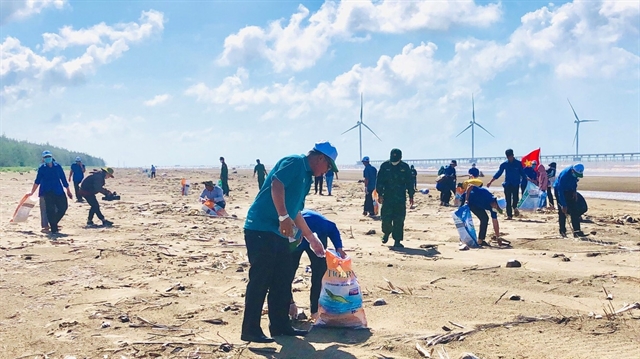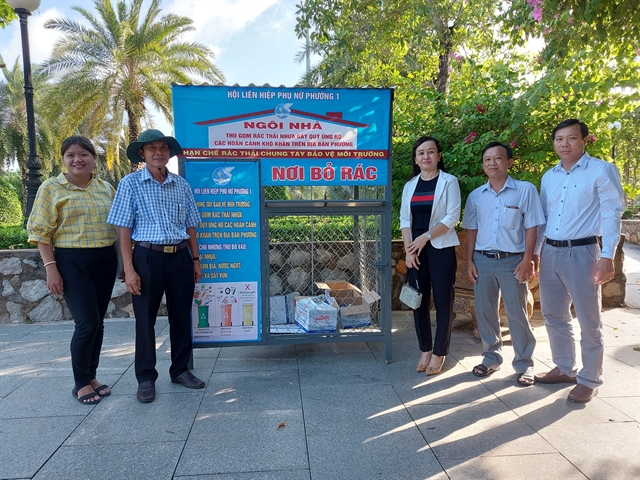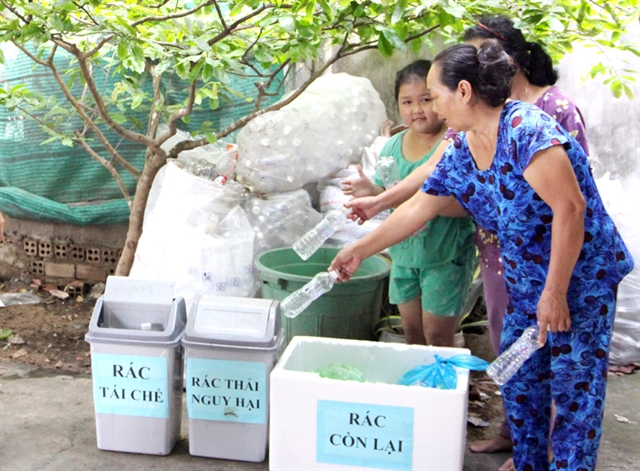 Environment
Environment

 |
| Annual beach clean-ups are among Trà Vinh Province’s plans to reduce plastic waste. – Photo tapchitaichinh.vn |
Trà Vinh Province has been making efforts to tackle plastic pollution, and has ambitious goals.
By 2025 it aims to reduce plastic on beaches by more than 50 per cent, collect 50 per cent of discarded fishing tools and ensure 80 per cent of tourist attractions and places of accommodation do not use single-use plastics.
There will be at least one annual beach clean-up campaign.
It hopes to become free of plastic waste by 2030 and have more than two annual beach clean-ups.
 |
| A plastic-collecting model was set up in Trà Vinh’s central park to encourage proper plastic disposal. – Photo snnptnt.travinh.gov.vn |
To reach these goals, the province has been raising public awareness of single-use plastics through the media, promoting recycling and upcycling, and encouraging users to opt for environment-friendly alternatives.
Besides, training courses on minimising plastic use and disposing of plastics have been organised for locals, fishermen, ship captains, organisations, and enterprises.
It has had trash bins set up along beaches and tourist attractions and proper waste disposal areas to easily collect and sort plastic waste at source.
Policies regarding plastic collection and disposal have been implied in tourism activities, beach services, seafood farming, and other ocean economic activities, with regular inspections to timely handle violations.
 |
| Lưu Nghiệp Anh Ward’s environmental club of Trà Vinh Province has provided every household with trash classification bins to properly sort out household waste. – Photo baotravinh.vn |
The province has also been promoting garbage segregation among locals and enterprises, and adopting proper plastic management strategies.
It has been seeking international collaborations to develop plastic processing technologies, including with ocean-related organisations on managing plastic waste and facilitating investment in effective sorting and recycling models.
Besides its action plan, Trà Vinh has also organised meetings and programmes and set up clubs to spread awareness and promote environmental protection.
In May this year a programme called “Exchange plastic for gifts” was organised by the Women’s Union of Tập Sơn Ward in Trà Cú District.
The waste collected through the programme was sold to recyclers with the funds used to help underprivileged and elderly local people.
In Lưu Nghiệp Anh Ward of Trà Vinh, the Women’s Union set up the “Segregating and managing household waste” club in April to encourage domestic sorting of waste and reusing organic waste for agricultural purposes.
Phan Thị Kiều Tiên, chairwoman of the Women’s Union, said each household was provided with three trash bins, one each for plastic and recyclable waste, regular household waste, and inorganic and hazardous waste.
On June 4 the province held an event titled “Solutions for plastic pollution” which involved setting up a plastic collection model in the provincial central park and several environmental activities.
Nguyễn Văn Liệu, vice chairman of the provincial People’s Committee, said fighting plastic waste and environmental problems would help avoid burial of trash and overflowing landfills, improving the living environment and preventing water and soil contamination.
According to a province survey in 2021, tourist attractions and traditional markets were the main sources of plastic waste, from 13.3 to 83.3 per cent and from 23.3 to 45.2 per cent, respectively.
Large amounts of plastics also came from seafood farming due to fish feed packaging and plastic chemical bottles, it found.
"Last year, the volume of daily household waste in the province was 482 tonnes, of which 99.5 per cent and 86.57 per cent were treated, respectively, in urban and rural areas," chairman of the provincial People's Committee Lê Văn Hẳn said.
“Thus, around 39 tonnes of trash were released daily into the environment, of which plastic waste accounted for 2.11 tonnes.”
He said effective management would prevent and limit the amount of plastic waste, contributing to the success of the national strategy for integrated management of solid waste to 2025, vision to 2050. – VNS




